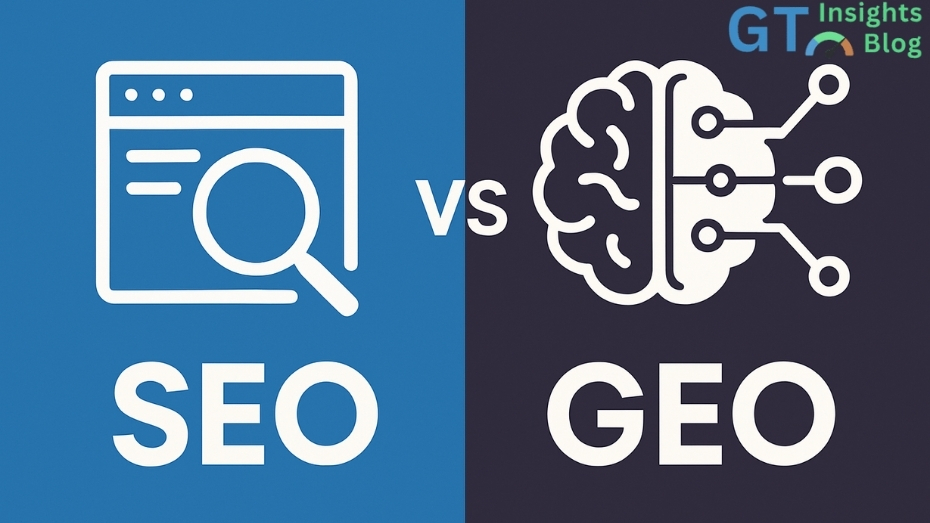
As the digital world evolves, businesses and marketers are witnessing a paradigm shift in online visibility strategies. Traditionally, SEO (Search Engine Optimization) has been the cornerstone of driving traffic through Google, Bing, and other search platforms. Now, a new player is entering the arena GEO (Generative Engine Optimization), which focuses on optimizing content for AI-driven generative engines like ChatGPT, Perplexity AI, and Google’s Gemini.
In this article, we’ll explore what SEO and GEO mean, how they differ, and why businesses need to prepare for a future where both coexist.
Understanding SEO: Search Engine Optimization
SEO is the long-standing process of optimizing digital content to rank higher on search engines.
- Core Objective: Improve visibility on search engine results pages (SERPs).
- Techniques Involved:
- On-page optimization (keywords, meta tags, headers)
- Off-page SEO (backlinks, brand mentions)
- Technical SEO (website speed, mobile-friendliness, crawlability)
- Content SEO (long-form content, contextual relevance, user intent matching)
- User Journey in SEO:
Users type queries → search engine crawls and ranks web pages → shows ranked results → user clicks through a website.
SEO has become an essential digital marketing practice since Google dominates how people discover information.
Understanding GEO: Generative Engine Optimization
GEO, or Generative Engine Optimization, is the emerging practice of optimizing content for AI-powered answer engines that generate responses instead of traditional result pages.
- Core Objective: Ensure your brand, product, or content gets cited, referenced, or surfaced in AI-generated answers.
- Techniques Involved:
- Structuring content so AI engines can extract and summarize accurately.
- Building authoritative digital footprints (citations, structured data, credible mentions).
- Prioritizing conversational, human-like content that aligns with natural language queries.
- Optimizing for zero-click answers since users may not leave the AI environment.
- User Journey in GEO:
Users ask questions → generative engine creates a synthesized response → your brand/content may be referenced or linked within that answer.
This shift changes the marketing ecosystem visibility is no longer about being “ranked,” but about being “mentioned and trusted” in an AI-generated reply.
SEO vs. GEO: Key Differences
| Factor | SEO (Search Engine Optimization) | GEO (Generative Engine Optimization) |
|---|---|---|
| Platform Focus | Search engines (Google, Bing, Yahoo) | Generative AI engines (ChatGPT, Perplexity, Gemini) |
| Goal | Rank higher in SERPs for clicks | Get cited and referenced in AI answers |
| Content Style | Keyword + intent driven | Conversational, structured, context-rich |
| User Journey | Click-through to a website | Zero-click answers directly in AI-generated content |
| Metrics of Success | Organic traffic, rankings, CTR | Mentions, citations, AI visibility, brand authority |
| Timeframe | Established and mature | Emerging and still evolving |
Why GEO Matters Alongside SEO
- Rise of AI Search: With billions of queries handled daily by generative engines, user discovery habits are shifting.
- Reduced Click-Through Traffic: AI tools answer directly, meaning fewer users may visit sites—brands must adapt.
- Trust and Authority Matter More: Engines will surface only the most credible and well-structured data.
- Early-Mover Advantage: Just as businesses who adopted SEO early dominated online search, adopting GEO now could secure future dominance in AI-powered search.
Also Read: What is LCP
How to Prepare for GEO
- Create Structured, AI-Friendly Content: Use FAQs, lists, schema markup, and well-organized writing.
- Build Digital Authority: Earn authoritative backlinks, strong brand mentions, and citations.
- Adopt Conversational Tone: Write in natural, human-like language matching AI-driven queries.
- Focus on Trust Signals: Highlight expertise, transparency, and credibility for inclusion in AI-generated outputs.
- Experiment with Visibility Monitoring: Track where and how generative engines mention your content.
The Future: SEO and GEO Working Together
SEO will not disappear—Google remains dominant. But GEO is set to complement it as AI-driven answers become mainstream. The future of digital strategy will involve a hybrid approach:
- Use SEO to capture traffic from search engines.
- Use GEO to ensure your brand shows up in generative AI answers.
Together, they define the next frontier of digital optimization.
FAQs on SEO vs. GEO
What is the main difference between SEO and GEO?
SEO (Search Engine Optimization) focuses on ranking websites on search engines like Google, while GEO (Generative Engine Optimization) focuses on making content visible and cited in AI-generated responses from tools like ChatGPT, Perplexity AI, and Google Gemini.
Will GEO replace SEO in the future?
No. SEO will continue to be crucial since people still rely on search engines. However, as more users shift their queries to AI-driven tools, GEO will complement SEO and become just as important for digital visibility.
How can businesses optimize for generative engines?
Businesses can optimize for GEO by:
- Publishing authoritative and structured content
- Using a conversational and natural tone
- Ensuring credibility through citations and trust signals
- Implementing schema markup and FAQs that AI can extract easily
Why do brand mentions matter more in GEO?
Unlike search engines, where rankings determine visibility, generative engines summarize content directly. Being mentioned or cited as a trusted source in those AI responses ensures brand exposure even without users clicking through to the original site.
What metrics should I track in GEO?
In GEO, success is measured less by website traffic and more by:
- Mentions in AI answers
- Citations or references in generated responses
- Brand authority and perceived expertise in your field
Can I use the same content strategy for SEO and GEO?
Not exactly. SEO relies heavily on keywords and ranking factors, while GEO requires well-structured, conversational, and authoritative content that an AI can easily interpret. Ideally, businesses should develop a hybrid content strategy that works for both.
Which industries will benefit the most from GEO?
Industries with information-rich content such as education, finance, travel, healthcare, and tech—will likely benefit first, since generative engines thrive on data-rich sources to generate answers.